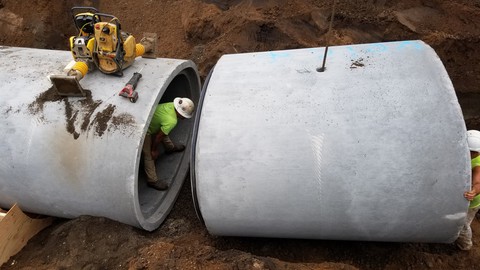
Water Engineering for Concrete Pipes
Water Engineering for Concrete Pipes, available at $19.99, with 35 lectures, and has 5 subscribers.
You will learn about Graduate Civil Engineers Graduate Water Engineers Intermediate Civil Engineers Intermediate Water Engineers This course is ideal for individuals who are Water Engineering ( Water Supply, Stormwater, Sewerage) for Concrete pipes It is particularly useful for Water Engineering ( Water Supply, Stormwater, Sewerage) for Concrete pipes.
Enroll now: Water Engineering for Concrete Pipes
Summary
Title: Water Engineering for Concrete Pipes
Price: $19.99
Number of Lectures: 35
Number of Published Lectures: 35
Number of Curriculum Items: 35
Number of Published Curriculum Objects: 35
Original Price: $19.99
Quality Status: approved
Status: Live
What You Will Learn
- Graduate Civil Engineers
- Graduate Water Engineers
- Intermediate Civil Engineers
- Intermediate Water Engineers
Who Should Attend
- Water Engineering ( Water Supply, Stormwater, Sewerage) for Concrete pipes
Target Audiences
- Water Engineering ( Water Supply, Stormwater, Sewerage) for Concrete pipes
A water engineer specializes in the planning, design, and management of water-related infrastructure and systems. They are responsible for addressing various aspects of water management, including water supply, treatment, distribution, wastewater management, and stormwater control.
Water engineers play an important role in optimizing water resource utilization, managing water quality, and mitigating the impacts of water-related challenges like scarcity, pollution, and climate change. Their expertise is essential in providing communities with reliable and sustainable water supply and treatment systems.
This course has been prepared to assist engineers with the hydraulic design of precast concrete conduits. It is hoped it will also be useful in the field of engineering education. It consolidates information from several sources and presents it in a practical and usable form.
The first section is a precise treatment of theoretical hydraulic concepts used in the manual. It should be used when necessary to assist with the understanding of the subsequent subjects. The remaining five sections consider the practical design aspects of individual subjects, namely, runoff, culverts, drains, sewers and pressure pipes. Each of the latter sections concludes with worked examples which may be used as models for many practical problems. If more detailed information is required, references are listed at the end of each section.
Course Curriculum
Chapter 1: Introduction
Lecture 1: Introduction
Lecture 2: Course content and Scope
Lecture 3: Notations and Symbols
Chapter 2: Flow of Water in Precast Concrete Conduits
Lecture 1: Physical Properties of Water
Chapter 3: Full Flow
Lecture 1: The Energy line & Energy losses ay Cross Sectional Energy Changes
Lecture 2: Energy Loss at Uniform Flow
Lecture 3: Part-full Flow (Uniform)
Lecture 4: Part-full flow ( Non-uniform)
Lecture 5: Boundary Shear
Lecture 6: Water Hammer
Chapter 4: Stormwater Runoff
Lecture 1: Rainfall
Lecture 2: Frequency
Lecture 3: Point Measurements of Rainfall Applied to an Area
Lecture 4: Peak Flow Rate Formula
Lecture 5: Time Concentration
Lecture 6: Limitations to Peak Flow Formula
Lecture 7: Tangent Check
Lecture 8: Examples
Chapter 5: Culverts
Lecture 1: Types of Culvert Flow Control
Lecture 2: Culverts with Outlet Control
Lecture 3: Examples : using nomograms
Lecture 4: Culverts not Flowing Full
Chapter 6: Stormwater Drainage
Lecture 1: Introduction
Lecture 2: Resistance to Flow in Conduits
Lecture 3: Inlet Shape Capacity
Lecture 4: Other Pit Types
Chapter 7: Separate Sewerage Systems
Lecture 1: Introduction
Lecture 2: Gravity Sewers
Lecture 3: The Sewer Dimensions
Chapter 8: Pressure Pipelines
Lecture 1: Introduction
Lecture 2: Design Flow Discharge
Lecture 3: Pressure Pipe Parameters
Lecture 4: Concrete Pipe Pressure Requirements
Lecture 5: Thrust Restraint
Lecture 6: Valves, Fitting and Pressure testing
Instructors
-
Rufaro Bakasa
Private Tutor and Intermediate Civil Engineer
Rating Distribution
- 1 stars: 0 votes
- 2 stars: 0 votes
- 3 stars: 0 votes
- 4 stars: 0 votes
- 5 stars: 0 votes
Frequently Asked Questions
How long do I have access to the course materials?
You can view and review the lecture materials indefinitely, like an on-demand channel.
Can I take my courses with me wherever I go?
Definitely! If you have an internet connection, courses on Udemy are available on any device at any time. If you don’t have an internet connection, some instructors also let their students download course lectures. That’s up to the instructor though, so make sure you get on their good side!
You may also like
- Top 10 Language Learning Courses to Learn in November 2024
- Top 10 Video Editing Courses to Learn in November 2024
- Top 10 Music Production Courses to Learn in November 2024
- Top 10 Animation Courses to Learn in November 2024
- Top 10 Digital Illustration Courses to Learn in November 2024
- Top 10 Renewable Energy Courses to Learn in November 2024
- Top 10 Sustainable Living Courses to Learn in November 2024
- Top 10 Ethical AI Courses to Learn in November 2024
- Top 10 Cybersecurity Fundamentals Courses to Learn in November 2024
- Top 10 Smart Home Technology Courses to Learn in November 2024
- Top 10 Holistic Health Courses to Learn in November 2024
- Top 10 Nutrition And Diet Planning Courses to Learn in November 2024
- Top 10 Yoga Instruction Courses to Learn in November 2024
- Top 10 Stress Management Courses to Learn in November 2024
- Top 10 Mindfulness Meditation Courses to Learn in November 2024
- Top 10 Life Coaching Courses to Learn in November 2024
- Top 10 Career Development Courses to Learn in November 2024
- Top 10 Relationship Building Courses to Learn in November 2024
- Top 10 Parenting Skills Courses to Learn in November 2024
- Top 10 Home Improvement Courses to Learn in November 2024






















